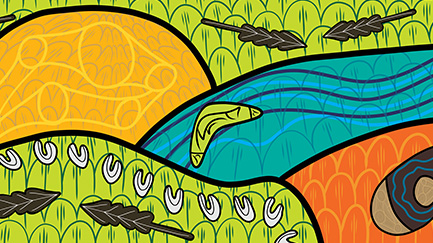
Recognising National Reconciliation Week 2025
In recognition of National Reconciliation Week, Mates4Mates is sharing the story of Aboriginal artist, Ma’sud Ghungarie Sanders who recently created a beautiful piece of artwork for their Head Office.

Have you ever thought about seeing a psychologist but aren’t too sure what they do or what’s involved? Perhaps you’ve heard terms such as CBT, ACT, EMDR, DBT, CPT and wondered what they mean. If so, you’re not alone.
Seeing a psychologist doesn’t just mean talking about your feelings - at Mates4Mates we provide a range of evidence-based treatments that improve mental health and wellbeing.
Here’s a look into the different forms of treatment:
Cognitive Behavioural Therapy (CBT)
CBT is a short-term treatment that assists people to identify and challenge unhelpful thinking patterns, emotions and behaviours and adopt healthier thoughts and behaviours. This approach can be applied to a wide range of mental health issues and people of most ages.
Dialectical Behaviour Therapy (DBT)
DBT specifically focuses on four key areas; mindfulness, distress tolerance, emotion regulation and interpersonal effectiveness. By focussing on these areas, individuals learn to effectively use strategies to assist them in dealing with relationships, stressful situations, impulsivity, anger and other distressing feelings and situations more effectively
Eye Movement Desensitization and Reprocessing (EMDR)
During EMDR, individuals recall traumatic experiences in brief doses while the therapist directs their eye movements. EMDR is based on the idea that negative thoughts, feelings and emotions are the result of unprocessed memories from unpleasant experiences. Numerous studies have demonstrated the effectiveness of EMDR in treating PTSD.
Acceptance and Commitment Therapy (ACT)
ACT teaches individuals to stop avoiding, denying, and struggling with their inner emotions and, instead, accept that these deeper feelings are appropriate responses to certain situations that should not prevent them from moving forward in their lives.
Cognitive Processing Therapy (CPT)
CPT typically involves 12 weekly sessions to identify and explore the ways that trauma may have altered a person’s thoughts and beliefs. Strategies are taught to challenge and modify unhelpful thoughts and take-home worksheets and exercises form an integral part of therapy.
Find out more If any content in this article resonates with you and you’d like to speak with someone at Mates4Mates about seeking support, contact us to find out more about our services. All Mates4Mates services are available for current and ex-serving Australian Defence Force members with physical injuries or mental health issues, and their families.
Contact Us

In recognition of National Reconciliation Week, Mates4Mates is sharing the story of Aboriginal artist, Ma’sud Ghungarie Sanders who recently created a beautiful piece of artwork for their Head Office.